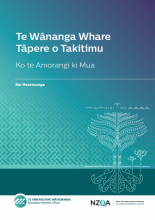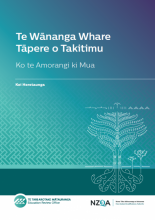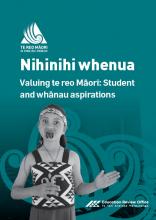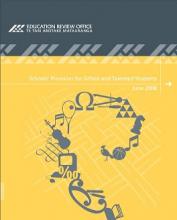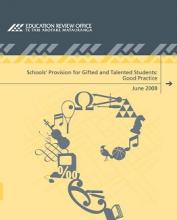- Topics: Families, Gifted and Talented Education (GATE), Questionnaire, Stand Children's Services Tu Maia Whanau, Te Pou Mataaho | Evaluation and Research Māori
- Published: 19 Jan 2021
Te Kahu Whakahaumaru – Ngā mahi a te rangai mātauranga Māori (English)
Te Pou Mataaho, ERO’s evaluation and research group, and Te Uepū ā Motu, ERO’s national evaluation and review team, pursued this evaluation to provide an evidence base about the initial impacts of Covid-19 on Māori-medium education and how the sector responded.
- Published: 19 Jan 2021
Te Kahu Whakahaumaru – Ngā mahi a te rangai mātauranga Māori (Māori)
I whāia tēnei arotake e Te Pou Mataaho, te rōpū arotake, rangahau hoki a Te Tari Arotake Mātauranga me Te Uepū ā-Motu, te rōpū arotake ā-motu a Te Tari Arotake Mātauranga, ki te whakaputa i tētahi kohinga taunakitanga e kitea ai ngā pānga tōmua o te Mate Korona ki te rāngai mātauranga reo Māori, me ngā rautaki i whāia ai e taua rāngai.
- Published: 10 Dec 2020
Te Kahu Whakahaumaru: Māori continue to show resilience across Māori-medium education
In Aotearoa, Māori-medium education experienced significant disruption when the outbreak of Covid-19 forced kura to close their doors, and whānau and kaiako to adjust to home schooling and distance learning. Among the many challenges were access to technology and resources with Māori communities among the most affected.
- Published: 10 Dec 2020
E whakatinana tonu nei te rāngai mātauranga reo Māori i te manawanui
I Aotearoa nei, i tino raru te rāngai mātauranga reo Māori i te horapatanga o te Mate Korona, i kati ai ngā tatau o ngā kura, i mate ai hoki ngā whānau me ngā kaiako ki te tīni i ā rātou mahi ki te whakaako ki te kāinga me te ako tawhiti.
Ko tētahi raru i roto i te huhua, ko te korenga o ngā taputapu matihiko me ngā rauemi, ka mutu ko ngā hapori Māori ērā i rongo i te korekore rawa atu nei.
- Published: 15 Sep 2020
Nihinihi Whenua – Valuing te reo Māori: Student and whānau aspirations
This report provides a snapshot of student and whānau perspectives on the teaching of te reo Māori. It follows the June publication of Te Tāmata Huaroa, which provides a review of the current status of te reo Māori in English medium school settings.
- Published: 18 Jun 2020
Te Tāmata Huaroa: Te Reo Māori in English-medium Schooling
This report gives a snapshot of the current provision of te reo Māori teaching and learning in a representative sample of English-medium primary and secondary schools. The education sector is seen as an important lever in the Government’s Maihi Karauna strategy for language revitalisation.
- Published: 01 Jun 2018
Schools' Provision for Gifted and Talented Students
In 2008 the Education Review Office evaluated schools’ provision for gifted and talented students.
- Published: 01 Sep 2016
An evaluation of Stand Children's Services: Children's Villages
Until recently children with behavioural and social needs were referred to and attended one of six health camps situated across New Zealand. Each of the six health camps had an associated school attached. In 2008 ERO evaluated the quality of provisions for children at the health camps and identified significant areas that needed to improve. ERO recommended that the Ministry of Education examine the role of health camps and their schools within the wider network provision of services for students with moderate to severe behaviour difficulties.
- Published: 10 Jul 2013
Including Students with High Needs Primary Schools
This ERO evaluation reports on primary schools' progress in relation to the Government's Success for All policy. Success for All is about getting all schools to demonstrate inclusive practice for students with special needs.
- Published: 30 Apr 2013
How is my child doing?
ERO guides for parents have been written for everyone who parents a child - those who have care and responsibility for children attending a school. The booklets include questions you can ask, as well as general information that you may find useful. Click on the booklet to read and download.
How is my child doing? suggests questions parents can ask teachers in primary and secondary schools about their child's learning and wellbeing at school, and what to expect. It also looks at what makes a successful school.
- Published: 09 Sep 2012
Including Students with High Needs: School Questionnaire Responses (2)
All children deserve the right to an education including those with special education needs. Through its Success for All policy, the Government expects all schools to demonstrate inclusive practice for children with special education needs by the end of 2014. This report presents the findings of a questionnaire where schools assess their own provisions for students with special education needs. It follows on from a similar report produced in early 2012.
- Published: 01 Apr 2012
Including Students with Special Needs: School Questionnaire Responses
This report, Including Students with Special Needs: school questionnaire responses presents the findings from a questionnaire completed by schools reviewed in the first two terms of 2011. It is based on schools’ own views of how well they include children with special needs.
- Published: 30 Jun 2010
Including Students with High Needs
ERO evaluated how well schools included students with high needs. Approximately three percent of the student population have significant physical, sensory, neurological, psychiatric, behavioural or intellectual impairment. ERO’s evaluation showed that approximately half of the schools in the study demonstrated inclusive practice, while 30 percent had ‘pockets of inclusive practice’ and 20 percent had few inclusive practices.
- Published: 01 Jun 2008
Schools' Provision for Gifted and Talented Students: Good Practice
In 2008 the Education Review Office evaluated schools’ provision for gifted and talented students.
School boards of trustees, through their principals and staff, are required to use good quality assessment information to identify students who have special needs (including gifted and talented), and to develop and implement teaching and learning strategies to meet the needs of these students.
A group of schools was particularly effective in providing for gifted and talented students and ERO has set out their good practice in this report.
